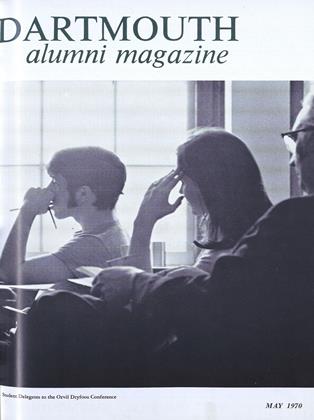Reporting on a survey of college teachers ... their opinions on political and educational issues
Faculty Profile: What do college teachers think about such issues as the war in Vietnam? the quality of higher education? the activism of students? To find out, researchers for the Carnegie Commission on Higher Education have surveyed more than 60,000 faculty members in all ranks and most major disciplines. Early results of the study suggest that faculty members as a group may be more conservative on educational matters than they are on political matters.
On questions of national and international policy, says one of the researchers, faculty members appear to be far more liberal than the general population and other professional groups. But when their immediate self-interest is involved, as in the case of student demonstrations, the teachers exhibit a "striking and clear shift toward a more conservative attitude." Consider:
Political position % Left or liberal 47.0 Middle of the road 24.9 Moderately or strongly conservative 24.4 1968 vote for President Humphrey 50.1 Nixon 29.8 Wallace 0.8 Other candidate 2.2 Did not vote 10.5 Position on Vietnam U.S. should withdraw immediately 19.0 Encourage a coalition government 42.1 Reduce commitment, prevent Communist takeover 29.1 Defeat Communists whatever the cost 6.0 View of radical student activism Approve 44.3 Disapprove 54.1
Attitudes on campus issues Agree agree Students who disrupt a campus should be suspended or expelled 76.7 21.4 Campus disruptions by militant students are a threat to academic freedom .... 80.1 17.3 Campus rules are generally administered in a reasonable way 81.5 15.8 More minority-group undergraduates should be admitted even if it means relaxing academic standards 41.0 56.8 Most undergraduates are basically satisfied with their education 67.2 28.2 Undergraduate education would be improved if: All courses were elective 19.4 77.6 Grades were abolished 30.9 66.1 Junior faculty members have too little say in running my department 31.7 65.7 Scholarship is threatened by the proliferation of big research centers 30.2 64.3 Faculty unions have a divisive effect on academic life 49.1 43.7 ["No answer" not included]
PREPARED FOR OUR READERS BY THE EDITORS OF THE CHRONICLE OF HIGHER EDUCATION
In Brief: President Nixon has proposed a "thoroughgoing overhaul" of federal programs in higher education, with major stress on aid to low-income students. 'Academic leaders have reacted caustically, predicting a growing burden on other students, private colleges...
A constitutional challenge to the concept of federal grants for church-related colleges has been rejected by a U.S. district court: "We find no conflict between preservation of religious freedom and provision for higher education." The plaintiffs, 15 taxpayers, will appeal...
College and university governing boards are giving greater representation to Negroes, women, and young people, a study by Educational Testing Service shows, but not much to students and faculty members...
Major campus demonstrations occurred at a rate of about one a day in early 1970, reports the Urban Research Corporation. It says the incidents were about as violent as last year's... Consultants hired by the Michigan legislature have advised it not to crack down on student protesters ...
An activist spirit appears to be developing among graduate students preparing for careers in student personnel administration. They want the profession to take stands on social issues...
Enactment of expanded educational benefits for veterans is expected to bring a steady increase in their enrollment in college...
Negro students have been relying heavily on community colleges, according to a study by the American Association of Junior Colleges. The association has been urged by minority-group members to help end "racism in education."
Departments Apart: Carnegie researchers have found that the opinions of college teachers tend to divide along departmental lines. Liberals predominate in the social sciences and the humanities, while conservatives are concentrated particularly in such disciplines as agriculture, physical education, home economics, and engineering. Thus, when asked what they thought of the emergence of radical student activism, nearly three-fourths of the sociologists said they approved of it, but less than one-fifth of the teachers in agriculture said the same.
 View Full Issue
View Full Issue
More From This Issue
-
 Feature
FeatureA CHANCE FOR THE PENTAGON TO HELP SOLVE SOME DOMESTIC AS WELL AS MILITARY PROBLEMS
May 1970 By GERALD G. GARBACZ '58 -
 Feature
FeatureThe Great Love Affair Between Students and Films
May 1970 By MAURICE H. RAPF '35 -
 Feature
FeatureProject IMPRESS
May 1970 By JOANNA STERNICK -
 Feature
FeatureStudent Views Feature Dryfoos Conference
May 1970 -
 Article
ArticleThe Undergraduate Chair
May 1970 By WINTHROP A. ROCKWELL '70 -
 Article
ArticleThe Faculty
May 1970 By WILLIAM R. MEYER







